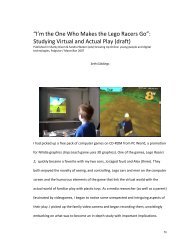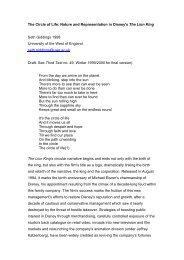Walkthrough: videogames and technocultural form - Seth Giddings
Walkthrough: videogames and technocultural form - Seth Giddings
Walkthrough: videogames and technocultural form - Seth Giddings
You also want an ePaper? Increase the reach of your titles
YUMPU automatically turns print PDFs into web optimized ePapers that Google loves.
Druckrey’s vision of repulsive fantasies <strong>and</strong> hypnotic alienation is not in itself technophobic, not a warning<br />
about <strong>technocultural</strong> change as a whole. Rather it establishes an opposition between ‘good’ new media <strong>and</strong><br />
‘bad’ new media of which the videogame is the exemplar. That the good new media are an anticipated<br />
development, <strong>and</strong> have yet to be realised is intriguing. To borrow a Darwinian concept from the geneticist<br />
Richard Goldschmidt, <strong>videogames</strong> might be viewed as ‘hopeful monsters’, aberrations or mutants;<br />
monstrous in themselves but with the potential to bring about quite new entities <strong>and</strong> effecting radical change<br />
(or in more <strong>technocultural</strong> terms, paradigm shifts) through macromutation rather than gradual development<br />
(cited in Gould 1977). Alluquere Roseanne Stone, in her book The War of Technology <strong>and</strong> Desire at the<br />
Close of the Mechanical Age - a key text in the study of cyberculture - effects a similar move, positing<br />
computer games as integral to the development of good new media, yet at the same time as dangerous,<br />
threatening to divert this evolution into the commercial <strong>and</strong> the trivial. She argues that the one of the first<br />
computer games, Spacewar! (designed <strong>and</strong> played by the pioneering computer students at MIT in the early<br />
1960s), marks a paradigm shift in the development of computing: from computers as tools to computers as<br />
arenas for social experience. As an example of interactive (<strong>and</strong> two player) computer media Spacewar!<br />
promised new kinds of media experience: dialogues or conversations with <strong>and</strong> through computer networks,<br />
even a new public theatre. However, her enthusiasm for Spacewar!'s potential is tempered by its game<br />
nature, <strong>and</strong> a shoot-'em-up game at that. For Stone, whilst Spacewar! heralds the beginning of the virtual<br />
age, it simultaneously carries the seeds of this virtual age's possible destruction. As a shoot-'em-up game<br />
drawing on popular science fiction to animate simple graphics <strong>and</strong> physics with a cartoon violence rather<br />
than any narrative or communicative experience, it offers 'no particular redeeming virtue...'. For Stone,<br />
Spacewar!'s lineage - popular <strong>videogames</strong> - hold 'all the thrill [...] of chopping up Abel Gance's Napoleon to<br />
insert commercials for TV viewing' (Stone 1995: 26). The hope for this monster is that it is a game only by<br />
phenotype, but a far more noble artefact by genotype.<br />
Other new media scholars have celebrated the literary possibilities of the interactive narratives or<br />
images developed in computer <strong>and</strong> <strong>videogames</strong>. In an essay on Myst, David Miles identifies interesting<br />
precedents for the game's interactive narrative structure <strong>and</strong> atmosphere. The list is impressive: the gothic<br />
novel, Parsifal, Verne, modernist literature (Gide, Robbe-Grillet, Borges), Homer, early cinema. The essay is<br />
an imaginative attempt to take the computer game seriously, <strong>and</strong> to think of what its future might be.<br />
However in doing so it suppresses the 'low' cultural pleasures that have popularised <strong>and</strong> developed the <strong>form</strong>.<br />
Importantly, for Miles, Myst is not a ‘videogame’ at all, but an 'interactive multimedia novel on CD-ROM'<br />
41




